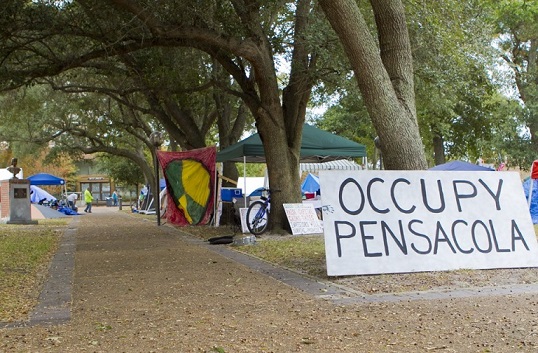Occupy Pensacola appeals latest ruling
- April 6, 2015
- / Staff Reports
- / government

On April 3, Occupy Pensacola appealed the recent ruling by Senior U.S. District Judge Roger Vinson in the case of Occupy Pensacola vs. The City of Pensacola.
Vinson ruled on March 13 in favor of the city in the case, which has it roots in the fall of 2011.
Local protesters modeling their efforts after the Occupy Wall Street movement conducted marches and pitched tents in in Martin Luther King, Jr. Plaza, later relocating to the north lawn of City Hall.
As the protest swelled to more than 60 tents and approximately 200 people, health and safety issues began to emerge and the city insisted the protestors obtain permits.
After Occupy Pensacola participants refused to obtain the proper permits, city officials ordered demonstrators to remove their tents and to comply with park regulations.
The group sued.
“The members of Occupy Pensacola, after careful consideration of the Order issued by Judge Vinson, determined it was necessary for the protection of First Amendment rights in this country, to take its case back to the 11th Circuit Court of Appeals in Atlanta, Georgia,” wrote Alistair McKenzie, lawyer for the group.
In November 2012, Vinson found that the city could lawfully ban the tents and granted summary judgment for the city. The plaintiffs appealed to the 11th Circuit Court of Appeals in Atlanta, which affirmed Vinson's ruling on the tents, but remanded the case for further consideration of the other claims.
Those included:
— A declaration that the special event permit scheme was unconstitutional on its face and as applied.
— By stopping their vigil on the North Lawn at 11 p.m., the City was applying “park regulations” to their protest (which was improper because the North Lawn is not classified as a “park”), and for this they sought to enjoin the City from enforcing those regulations and a declaration that they have the right to protest on the North Lawn 24 hours per day, and the right to protest on all sidewalks 24 hours per day (and not just those portions of the sidewalk the City designated).
— That the the City had selectively enforced both the tent ordinance and the special event ordinance against them.
— Challenging the constitutionality of the “parade ordinance”, which requires a permit for a parade or march, and they sought a declaration that they can march without a permit, and an injunction to prevent the city from applying the parade ordinance to their protest.
Vinson writes that the time and location restrictions the city placed on the Occupy protestors did not unduly restrict their ability to protest publicly through other means and venues.
Vinson's order, linked here, also finds that the plaintiffs lack standing on other counts in the case. Vinson noted that the protestors have continued to protest in other venues and around other causes in the time since the suit was originally filed.
McKenzie wrote via email that Occupy believes that Vinson’s ruling in the matter departed from established law regarding standing in First Amendment free speech cases, and that the judge’s summary judgment in favor of the City of Pensacola was improper due to factual disputes that existed at the time the court made its ruling.
“Occupy Pensacola is hopeful that its efforts in the appeal will be successful, as they were with the last appeal, and will result in the future protection of all Pensacola residents' First Amendment rights to speak and protest freely about political issues within the city limits,” McKenzie wrote.
 CivicCon launches with a look at good growth in cities
CivicCon launches with a look at good growth in cities
 Building stronger brains one baby, one parent at a time
Building stronger brains one baby, one parent at a time
 SCI debuts commercial on Early Learning City
SCI debuts commercial on Early Learning City
 Entrecon: World class speakers and an opportunity to sharpen skills
Entrecon: World class speakers and an opportunity to sharpen skills
 PYP Quality of Life survey 2017
PYP Quality of Life survey 2017
 EntreCon Pensacola 2016: A look back
EntreCon Pensacola 2016: A look back
 Leadership tip: getting better employee takeaways
Leadership tip: getting better employee takeaways
 Leadership tip: be interested instead of interesting
Leadership tip: be interested instead of interesting
 Leadership tip: delivering difficult messages
Leadership tip: delivering difficult messages
 Brain Bags boost Arc, Early Childhood Court programs
Brain Bags boost Arc, Early Childhood Court programs